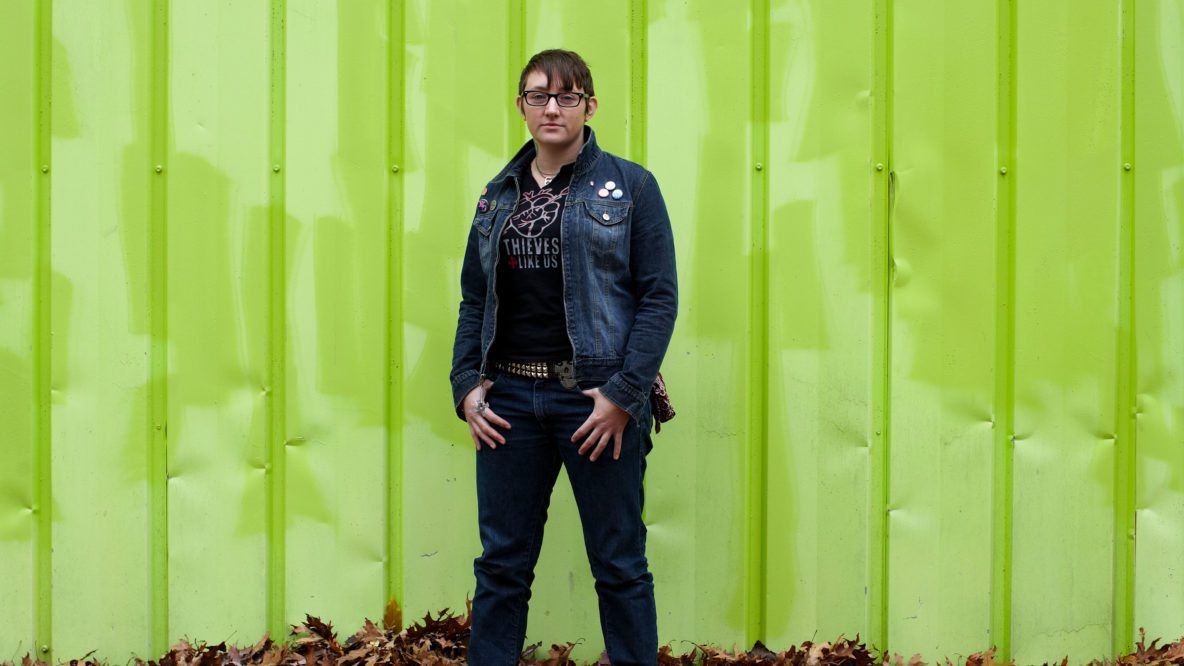

After queer Chicago punk band 8 Inch Betsy wrapped up a 30-day U.S. tour in 2010, many things appeared uncertain for the members. Their original drummer Stephanie Levi had left the band, and the transition from life on the road to everyday life left the remaining members Meghan Galbraith (guitar, vocals) and Eli Burke (bass) feeling downtrodden. Galbraith was up every night working as a bartender, then would wake up to “alone days of nothing after just coming off the high of tour and traveling all over the country,” as Burke puts it. This situation spawned the band’s latest album, The Mean Days, a meditation on life’s difficult experiences.
As Galbraith and Burke worked on the album, recording it with drummer Melissa Thomas, Galbraith became ill, so the two of them put their music on pause. Burke moved to Tucson to focus on making and studying art; he’s currently a PhD student in Art and Visual Culture Education at the University of Arizona. As Galbraith’s health declined, she asked Burke to release the album, which was mainly written by her, on her behalf.
Then, somewhat unexpectedly, Galbraith passed away at age 35 in 2015, leaving her bandmate heartbroken and eager to commemorate her in music. Burke released a physical version of the album in late 2015 but, preoccupied with grieving his friend’s death and undergoing a gender transition, has not been able to release it digitally until this year, on August 13.
“I felt a really deep sense of urgency to get it out there and release it in a way that was going to do it justice. I just want her music to be heard,” says Burke. “[Initially] we didn’t release it digitally [so] not a lot of people had access… That’s why I’m doing this now to get it digitally out there.”
The Mean Days might as well be a reference to the grunge heyday of ’90s; the band cites Hole and PJ Harvey as influences, but you’ll also hear hints of pop punk bands like Blink 182, Yellowcard, and MXPX. The songs open with strong guitar riffs and progress to catchy, emotive choruses, exploring relationships, transitional periods, and growing pains. On the title track, Galbraith sings of “slipping further through the cracks” as “the days turn to mean,” while “Water” tells a poetic story of renewal: “Yesterday I crawled out of the sea/Salt in my eyes and sand on my feet… wash me out inside.”
Burke describes The Mean Days as more mature than 8 Inch Betsy’s first album, 2008’s This Time Last Time Every Time. “Not only is it more mature in terms of we were all getting older, I think we were growing together and having musical experiences together. For me, it has more personal meaning because I know what the songs are about. I still love that first album — it has a real rawness to it that I really like — and so does this one.”
Even though Galbraith wrote the lyrics, songs like “Uh Oh” and “So Dark” touched Burke deeply when he first heard them. “She didn’t tell me this, but a lot of the lyrics are things I was going through, and I don’t know if she wrote them for me, but I just really resonated with the lyrics.” “True North” appeared to be drawn from conversations they’d had about leaving Chicago, and “I Will Never Go Home” references the band’s experiences on tour.
Currently busy with his PhD program, Burke is unsure where the band is headed in the absence of its lead singer. For now, his main goal is to continue Galbraith’s legacy, which also includes a not-yet-released solo album.
As part of an all-queer band, Galbraith and Burke found belonging in the punk scene, although most of their music is not explicitly political. “A lot of our songs are not overtly queer, but when I listen back to them, I think, ‘Wow, these are really queer songs,'” says Burke, who believes much of the band’s impact on the queer community came simply from connecting with queer fans.
“I think being queer, we were just able to connect with people who didn’t see themselves reflected in music during that time,” he explains. “I think we’re always looking outside for reflections of ourselves in the world, so I think when you can find that, it’s special and you want to hang onto that. I’m grateful a lot of the fans we have, I still talk to, so I think just having the support of the queer community meant a lot to us. I think it’s OK not to be overtly political and connect with people socially. That’s something that’s important.”
Indeed, that kind of connection and support is something that outlasts the life of an artist gone too soon.
Follow 8 Inch Betsy on Facebook for ongoing updates.

